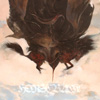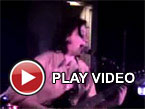Horseback, "The Gorgon Tongue"
 This two CD set, comprised of an album recorded in 2007 and a cassette that sold out ridiculously quick in 2010 showcases how much change has taken place in Jenks Miller's solo project. Even though he has never lost sight of his traditional minimalist foundation, this an early almost post-rock tinged album and a more contemporary metal one, which is more consistent with the recent work Horseback has put out.
This two CD set, comprised of an album recorded in 2007 and a cassette that sold out ridiculously quick in 2010 showcases how much change has taken place in Jenks Miller's solo project. Even though he has never lost sight of his traditional minimalist foundation, this an early almost post-rock tinged album and a more contemporary metal one, which is more consistent with the recent work Horseback has put out.
The first disc, the Impale Golden Horn album, is four longer tracks that is pretty much the most mellow and restrained sound I have ever heard from him.Both "Finale" and "The Golden Horn" emphasize these wonderfully expansive, shimmering waves of guitar that conjure none of the blackened, decimated lands that The Invisible Mountain did.Instead, there’s a multitude of subtle, undulating textures that constantly flow like a river, with "The Golden Horn" adding in tons of tremolo and quiet piano melodies.
"Laughing Celestial Architect" feels like it slows down the pace even more, with a sustained sheet of guitar notes that stretch out for an infinity, propelled by an almost imperceptible rhythm.The closing "Blood Fountain" possesses none of the metal trappings that the title would imply, and is actually a pretty piano and guitar duet over a bed of buzzing feedback.Most surprisingly, vocals from Miller and Mount Moriah (a folk/southern rock project in which Miller is also the guitarist) vocalist Heather McEntire appear, and they're actually singing.I only draw attention to this because most of the vocals in Horseback have been of the exasperated, tortured black metal variety, making this a truly different sound altogether.
The second disc, Forbidden Planet, was released as a cassette last year, and thus is a more current reflection of Horseback.Right from the opening "Veil of Maya (The Lamb Takes the Lion)," it sounds more like what I'm familiar with: a dense, impregnable wall of guitar noise, guttural vocals, but with the addition of what sounds like some electronic textures as well.While the album is pretty much mixed as a singular piece, the three part "A High Ashen Breeze" feels the most thematically unified,opening with rapid-fire guitar notes and big, echoing thuds, with the growling vocals buried deep in the mix.It transitions into a more noise-focused piece, with everything being engulfed in a wash of static by the end of the second piece, with the third continuing this frozen, but violent and raw sound.
The two shorter pieces that are interspersed highlight some more basic, but still very good sounds."Alabaster Shithouse," besides having the best song title of a 2011 release, is a relatively simple, but effective piece of layered, clashing guitar arpeggios that slither between each other, accompanied by Miller’s witchy screams.The closing "Introducing Blind Angels" goes to a completely different place, ending the album on a gentle ambient note, without any of the dense guitar or raw vocals to be heard.Comparatively, it's clearly the "metal" album of the two, but both really do share the same conceptual leanings.
One of the defining facets of Horseback, as I’ve said in previous reviews, is the true sense of minimalism employed in the composition of these songs.While so often bands will employ that term to explain why their album consists of a total of five notes over the span of 20 minutes, Jenks Miller goes back to the Terry Riley or Philip Glass sense of the term.The songs are never simplistic, but always manage to draw me in with their hypnotic repetition, all the while changing ever so slightly that, ten minutes later, I’m listening to something drastically different but have no clue how I got "there," metaphorically speaking.I must say that I was especially fond of the almost shoegaze/post-rock leanings of Impale Golden Horn, which put the Horseback sound into a different context entirely.It was obviously the same band, but with a different ambiance overall.
samples:
 



